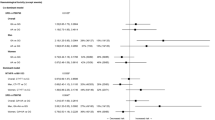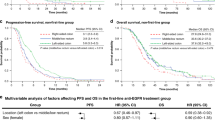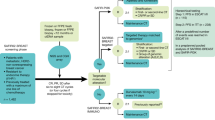Abstract
The aim of the study was the identification of a pharmacogenetic profile predictive of the tumor regression grade (TRG), considered as tumor response parameter, after neo-adjuvant treatment in rectal cancer patients. A total of 238 rectal cancer patients treated in a neo-adjuvant setting by a fluoropyrimidines-based chemo-radiotherapy (RT) were genotyped for 25 genetic polymorphisms in 16 genes relevant for treatment-associated pathways. Two polymorphisms were associated with TRG in a multivariate analysis: hOGG1-1245C>G, which can affect radiosensitivity and MTHFR-677C>T, which is involved in fluoropyrimidines action. Patients bearing at least one variant allele had a lower chance to get TRG⩽2 (OR=0.46 95% CI 0.23–0.90, P=0.024; and OR=0.48 95% CI 0.24–0.96, P=0.034; respectively). An association trend was observed for ABCB1-3435C>T, which is responsible for the multi-drug resistance (odds ratio (OR)=1.96, 95% confidence interval (CI) 0.98–3.95, P=0.057). Exploratory classification and regression tree (CART) analysis highlighted high-order gene–gene and gene–environment interactions and a genetic signature associated with differential response, with hOGG1-1245C>G as the most predictive factor. Other significant variables were: ABCB1-3435C>T, MTHFR-677C>T, ERCC1-8092C>A, ABCC2-1249G>A, XRCC1-28152G>A, XRCC3-4541A>G and patients gender. On the basis of CART results, patients were categorized into three groups according to tumor response probability: intermediate and high profiles had a higher probability to get TRG⩽2 as compared with low profiles (OR=4.12 95% CI 1.46–11.65, P<0.001 and OR=12.44, 95% CI 5.52–28.04, P<0.0001, respectively). This study evidences a major role of hOGG1-1245C>G and MTHFR-677C>T polymorphisms in the tumor response of rectal cancer patients treated with chemo-RT in neo-adjuvant setting, and shows the relevance of gene–gene and gene–environment interactions for complex phenotypes as tumor response.
This is a preview of subscription content, access via your institution
Access options
Subscribe to this journal
Receive 6 print issues and online access
$259.00 per year
only $43.17 per issue
Buy this article
- Purchase on Springer Link
- Instant access to full article PDF
Prices may be subject to local taxes which are calculated during checkout

Similar content being viewed by others
References
Bosset JF, Collette L, Calais G, Mineur L, Maingon P, Radosevic-Jelic L et al. Chemotherapy with preoperative radiotherapy in rectal cancer. N Engl J Med 2006; 355: 1114–1123.
Gerard JP, Conroy T, Bonnetain F, Bouche O, Chapet O, Closon-Dejardin MT et al. Preoperative radiotherapy with or without concurrent fluorouracil and leucovorin in T3-4 rectal cancers: results of FFCD 9203. J Clin Oncol 2006; 24: 4620–4625.
Minsky BD, Cohen AM, Kemeny N, Enker WE, Kelsen DP, Reichman B et al. Combined modality therapy of rectal cancer: decreased acute toxicity with the preoperative approach. J Clin Oncol 1992; 10: 1218–1224.
Pucciarelli S, Friso ML, Toppan P, Fornasiero A, Carnio S, Marchiori E et al. Preoperative combined radiotherapy and chemotherapy for middle and lower rectal cancer: preliminary results. Ann Surg Oncol 2000; 7: 38–44.
Aschele C, Friso ML, Pucciarelli S, Lonardi S, Sartor L, Fabris G et al. A phase I-II study of weekly oxaliplatin, 5-fluorouracil continuous infusion and preoperative radiotherapy in locally advanced rectal cancer. Ann Oncol 2005; 16: 1140–1146.
De Paoli A, Chiara S, Luppi G, Friso ML, Beretta GD, Del Prete S et al. Capecitabine in combination with preoperative radiation therapy in locally advanced, resectable, rectal cancer: a multicentric phase II study. Ann Oncol 2006; 17: 246–251.
Rodel C, Liersch T, Hermann RM, Arnold D, Reese T, Hipp M et al. Multicenter phase II trial of chemoradiation with oxaliplatin for rectal cancer. J Clin Oncol 2007; 25: 110–117.
Sauer R, Becker H, Hohenberger W, Rodel C, Wittekind C, Fietkau R et al. Preoperative versus postoperative chemoradiotherapy for rectal cancer. N Engl J Med 2004; 351: 1731–1740.
Chan AK, Wong A, Jenken D, Heine J, Buie D, Johnson D . Posttreatment TNM staging is a prognostic indicator of survival and recurrence in tethered or fixed rectal carcinoma after preoperative chemotherapy and radiotherapy. Int J Radiat Oncol Biol Phys 2005; 61: 665–677.
Stipa F, Chessin DB, Shia J, Paty PB, Weiser M, Temple LK et al. A pathologic complete response of rectal cancer to preoperative combined-modality therapy results in improved oncological outcome compared with those who achieve no downstaging on the basis of preoperative endorectal ultrasonography. Ann Surg Oncol 2006; 13: 1047–1053.
Rodel C, Martus P, Papadoupolos T, Fuzesi L, Klimpfinger M, Fietkau R et al. Prognostic significance of tumor regression after preoperative chemoradiotherapy for rectal cancer. J Clin Oncol 2005; 23: 8688–8696.
Vecchio FM, Valentini V, Minsky BD, Padula GD, Venkatraman ES, Balducci M et al. The relationship of pathologic tumor regression grade (TRG) and outcomes after preoperative therapy in rectal cancer. Int J Radiat Oncol Biol Phys 2005; 62: 752–760.
Beddy D, Hyland JM, Winter DC, Lim C, White A, Moriarty M et al. A simplified tumor regression grade correlates with survival in locally advanced rectal carcinoma treated with neoadjuvant chemoradiotherapy. Ann Surg Oncol 2008; 15: 3471–3477.
Habr-Gama A, de Souza PM, Ribeiro Jr U, Nadalin W, Gansl R, Sousa Jr AH et al. Low rectal cancer: impact of radiation and chemotherapy on surgical treatment. Dis Colon Rectum 1998; 41: 1087–1096.
Mohiuddin M, Marks G, Bannon J . High-dose preoperative radiation and full thickness local excision: a new option for selected T3 distal rectal cancers. Int J Radiat Oncol Biol Phys 1994; 30: 845–849.
Marijnen CA, Kapiteijn E, van de Velde CJ, Martijn H, Steup WH, Wiggers T et al. Acute side effects and complications after short-term preoperative radiotherapy combined with total mesorectal excision in primary rectal cancer: report of a multicenter randomized trial. J Clin Oncol 2002; 20: 817–825.
Gordon MA, Gil J, Lu B, Zhang W, Yang D, Yun J et al. Genomic profiling associated with recurrence in patients with rectal cancer treated with chemoradiation. Pharmacogenomics 2006; 7: 67–88.
Terrazzino S, Agostini M, Pucciarelli S, Pasetto LM, Friso ML, Ambrosi A et al. A haplotype of the methylenetetrahydrofolate reductase gene predicts poor tumor response in rectal cancer patients receiving preoperative chemoradiation. Pharmacogenet Genomics 2006; 16: 817–824.
Villafranca E, Okruzhnov Y, Dominguez MA, Garcia-Foncillas J, Azinovic I, Martinez E et al. Polymorphisms of the repeated sequences in the enhancer region of the thymidylate synthase gene promoter may predict downstaging after preoperative chemoradiation in rectal cancer. J Clin Oncol 2001; 19: 1779–1786.
Pucciarelli S, Toppan P, Friso ML, Russo V, Pasetto L, Urso E et al. Complete pathologic response following preoperative chemoradiation therapy for middle to lower rectal cancer is not a prognostic factor for a better outcome. Dis Colon Rectum 2004; 47: 1798–1807.
AJCC American Joint Committee on Cancer (1997). In: Fleming DI, Cooper SJ, Henson ED, Hutler VR, Kennedy JB, Murphy PG, O’Sulivan B, Sobin HL, Yarbo WJ (eds). AJCC Cancer Staging Manual, 5th edn, 2009. Lippincott-Raven: Philadelphia, pp 83–90.
Mandard AM, Dalibard F, Mandard JC, Marnay J, Henry-Amar M, Petiot JF et al. Pathologic assessment of tumor regression after preoperative chemoradiotherapy of esophageal carcinoma. Clinicopathologic correlations. Cancer 1994; 73: 2680–2686.
Chen CL, Liu Q, Relling MV . Simultaneous characterization of glutathione S-transferase M1 and T1 polymorphisms by polymerase chain reaction in American whites and blacks. Pharmacogenetics 1996; 6: 187–191.
Ulrich CM, Bigler J, Bostick R, Fosdick L, Potter JD . Thymidylate synthase promoter polymorphism, interaction with folate intake, and risk of colorectal adenomas. Cancer Res 2002; 62: 3361–3364.
Ryan R, Gibbons D, Hyland JM, Treanor D, White A, Mulcahy HE et al. Pathological response following long-course neoadjuvant chemoradiotherapy for locally advanced rectal cancer. Histopathology 2005; 47: 141–146.
Srinivasan BS, Chen J, Cheng C, Conti D, Duan S, Fridley BL et al. Methods for analysis in pharmacogenomics: lessons from the Pharmacogenetics Research Network Analysis Group. Pharmacogenomics 2009; 10: 243–251.
Gurska S, Farkasova T, Gabelova A . Radiosensitivity of cervical cancer cell lines: the impact of polymorphisms in DNA repair genes. Neoplasma 2007; 54: 195–201.
Vodicka P, Stetina R, Polakova V, Tulupova E, Naccarati A, Vodickova L et al. Association of DNA repair polymorphisms with DNA repair functional outcomes in healthy human subjects. Carcinogenesis 2007; 28: 657–664.
Chang PW, Zhang QM, Takatori K, Tachibana A, Yonei S . Increased sensitivity to sparsely ionizing radiation due to excessive base excision in clustered DNA damage sites in Escherichia coli. Int J Radiat Biol 2005; 81: 115–123.
Yang N, Galick H, Wallace SS . Attempted base excision repair of ionizing damage in human lymphoblastoid cells produces lethal and mutagenic double strand breaks. DNA Repair (Amst) 2004; 3: 1323–1334.
Jakobsen A, Nielsen JN, Gyldenkerne N, Lindeberg J . Thymidylate synthase and methylenetetrahydrofolate reductase gene polymorphism in normal tissue as predictors of fluorouracil sensitivity. J Clin Oncol 2005; 23: 1365–1369.
Sohn KJ, Croxford R, Yates Z, Lucock M, Kim YI . Effect of the methylenetetrahydrofolate reductase C677 T polymorphism on chemosensitivity of colon and breast cancer cells to 5-fluorouracil and methotrexate. J Natl Cancer Inst 2004; 96: 134–144.
Cohen V, Panet-Raymond V, Sabbaghian N, Morin I, Batist G, Rozen R . Methylenetetrahydrofolate reductase polymorphism in advanced colorectal cancer: a novel genomic predictor of clinical response to fluoropyrimidine-based chemotherapy. Clin Cancer Res 2003; 9: 1611–1615.
Sohn KJ, Jang H, Campan M, Weisenberger DJ, Dickhout J, Wang YC et al. The methylenetetrahydrofolate reductase C677T mutation induces cell-specific changes in genomic DNA methylation and uracil misincorporation: a possible molecular basis for the site-specific cancer risk modification. Int J Cancer 2009; 124: 1999–2005.
Leopardi P, Marcon F, Caiola S, Cafolla A, Siniscalchi E, Zijno A et al. Effects of folic acid deficiency and MTHFR C677 T polymorphism on spontaneous and radiation-induced micronuclei in human lymphocytes. Mutagenesis 2006; 21: 327–333.
Damaraju S, Murray D, Dufour J, Carandang D, Myrehaug S, Fallone G et al. Association of DNA repair and steroid metabolism gene polymorphisms with clinical late toxicity in patients treated with conformal radiotherapy for prostate cancer. Clin Cancer Res 2006; 12: 2545–2554.
De Ruyck K, Van Eijkeren M, Claes K, Morthier R, De Paepe A, Vral A et al. Radiation-induced damage to normal tissues after radiotherapy in patients treated for gynecologic tumors: association with single nucleotide polymorphisms in XRCC1, XRCC3, and OGG1 genes and in vitro chromosomal radiosensitivity in lymphocytes. Int J Radiat Oncol Biol Phys 2005; 62: 1140–1149.
Fink D, Aebi S, Howell SB . The role of DNA mismatch repair in drug resistance. Clin Cancer Res 1998; 4: 1–6.
Kim MK, Cho KJ, Kwon GY, Park SI, Kim YH, Kim JH et al. Patients with ERCC1-negative locally advanced esophageal cancers may benefit from preoperative chemoradiotherapy. Clin Cancer Res 2008; 14: 4225–4231.
Sakano S, Wada T, Matsumoto H, Sugiyama S, Inoue R, Eguchi S et al. Single nucleotide polymorphisms in DNA repair genes might be prognostic factors in muscle-invasive bladder cancer patients treated with chemoradiotherapy. Br J Cancer 2006; 95: 561–570.
Carles J, Monzo M, Amat M, Jansa S, Artells R, Navarro A et al. Single-nucleotide polymorphisms in base excision repair, nucleotide excision repair, and double strand break genes as markers for response to radiotherapy in patients with stage I to II head-and-neck cancer. Int J Radiat Oncol Biol Phys 2006; 66: 1022–1030.
Yoon SM, Hong YC, Park HJ, Lee JE, Kim SY, Kim JH et al. The polymorphism and haplotypes of XRCC1 and survival of non-small-cell lung cancer after radiotherapy. Int J Radiat Oncol Biol Phys 2005; 63: 885–891.
Kuschel B, Auranen A, McBride S, Novik KL, Antoniou A, Lipscombe JM et al. Variants in DNA double-strand break repair genes and breast cancer susceptibility. Hum Mol Genet 2002; 11: 1399–1407.
Kim MK, Cho KJ, Kwon GY, Park SI, Kim YH, Kim JH et al. ERCC1 predicting chemoradiation resistance and poor outcome in oesophageal cancer. Eur J Cancer 2008; 44: 54–60.
Hwang IG, Ahn MJ, Park BB, Ahn YC, Han J, Lee S et al. ERCC1 expression as a prognostic marker in N2(+) nonsmall-cell lung cancer patients treated with platinum-based neoadjuvant concurrent chemoradiotherapy. Cancer 2008; 113: 1379–1386.
Jun HJ, Ahn MJ, Kim HS, Yi SY, Han J, Lee SK et al. ERCC1 expression as a predictive marker of squamous cell carcinoma of the head and neck treated with cisplatin-based concurrent chemoradiation. Br J Cancer 2008; 99: 167–172.
Wu X, Gu J, Wu TT, Swisher SG, Liao Z, Correa AM et al. Genetic variations in radiation and chemotherapy drug action pathways predict clinical outcomes in esophageal cancer. J Clin Oncol 2006; 24: 3789–3798.
Harpole Jr DH, Moore MB, Herndon JE, Aloia T, D’Amico TA, Sporn T et al. The prognostic value of molecular marker analysis in patients treated with trimodality therapy for esophageal cancer. Clin Cancer Res 2001; 7: 562–569.
Schwab M, Zanger UM, Marx C, Schaeffeler E, Klein K, Dippon J et al. Role of genetic and nongenetic factors for fluorouracil treatment-related severe toxicity: a prospective clinical trial by the German 5-FU Toxicity Study Group. J Clin Oncol 2008; 26: 2131–2138.
Zhang W, Press OA, Haiman CA, Yang DY, Gordon MA, Fazzone W et al. Association of methylenetetrahydrofolate reductase gene polymorphisms and sex-specific survival in patients with metastatic colon cancer. J Clin Oncol 2007; 25: 3726–3731.
Acknowledgements
This study was supported by the Italian Ministry of Health grant (Programma speciale ex. art.12, 2005 and Ricerca Finalizzata RO Strategici 11/07) and AIRC (Associazione Italiana per la Ricerca sul Cancro). Samples were provided by Clinica Chirurgica II Tissue Biobank and CRO Biobank.
Author information
Authors and Affiliations
Corresponding author
Ethics declarations
Competing interests
The authors declare no conflict of interest.
Rights and permissions
About this article
Cite this article
Cecchin, E., Agostini, M., Pucciarelli, S. et al. Tumor response is predicted by patient genetic profile in rectal cancer patients treated with neo-adjuvant chemo-radiotherapy. Pharmacogenomics J 11, 214–226 (2011). https://doi.org/10.1038/tpj.2010.25
Received:
Revised:
Accepted:
Published:
Issue Date:
DOI: https://doi.org/10.1038/tpj.2010.25
Keywords
This article is cited by
-
Genetic Investigation of Polymorphic OGG1 and MUTYH Genes Towards Increased Susceptibility in Lung Adenocarcinoma and its Impact on Overall Survival of Lung Cancer Patients Treated with Platinum Based Chemotherapy
Pathology & Oncology Research (2019)
-
Association of thymidylate synthase polymorphisms with the tumor response to preoperative chemoradiotherapy in rectal cancer: a systematic review and meta-analysis
The Pharmacogenomics Journal (2017)
-
Personalizing Therapy for Locally Advanced Rectal Cancer
Current Colorectal Cancer Reports (2017)
-
Germline and somatic genetic predictors of pathological response in neoadjuvant settings of rectal and esophageal cancers: systematic review and meta-analysis
The Pharmacogenomics Journal (2016)
-
A meta-analysis identifies ERCC1 gene polymorphism as a predictor of better patient response to treatment with radiochemotherapy
Cancer Chemotherapy and Pharmacology (2016)



